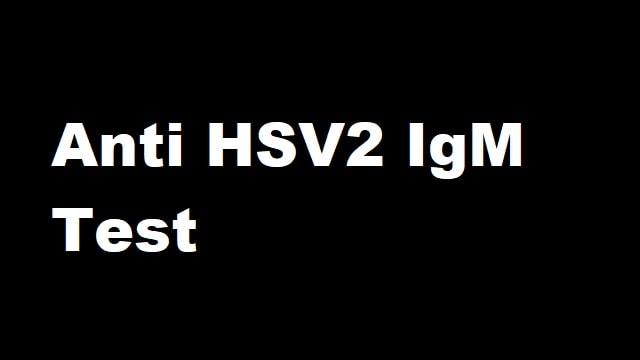Anti-HSV2 IgM Test
The HSV2 IgM anti-test is a type of blood test that can be used to detect early herpes simplex virus (HSV) infection caused by sexually transmitted infections. This test does not detect herpes directly. Instead, it looks for a type of IgM antibody that can be produced in response to herpes infection.
Herpes is a common viral infection caused by the herpes simplex virus (HSV). There are two types of the virus: HSV-1 and HSV-2. Herpes simplex virus 2 testing identifies the presence of the virus in a sample of a blister, sore, or fluid to diagnose an acute herpes infection, or detects herpes antibodies in the blood to determine previous herpes exposure.
HSV-2 infection can be contagious periodically and cause fever. This anti-HSV2 IgM test is also performed on newborns suspected of having neonatal herpes, a rare but serious condition. Neonatal herpes is transmitted to the baby during vaginal birth.
Reasons for Performing Anti HSV2 IgM Test?
HSV antibody testing can be used to help diagnose acute HSV infection if blood samples are collected several weeks apart (acute and convalescent samples). HSV IgV antibody levels are compared to see if they have increased significantly and indicate current infection.
Antibody testing can also be used to screen certain populations, such as sexually active people, organ transplant recipients, and those infected with HIV.
When Should You Do an Anti HSV2 IgM Test?
People who engage in risky sex, meaning not using condoms, having sex with more than one partner, and couples who want to plan a pregnancy or birth are advised to take an anti-HSV2 IgM test.
People with the following conditions are recommended to have an Anti HSV2 IgM test:
- People with recurrent genital sores or atypical symptoms who have negative results on HSV PCR or culture.
- People who have been clinically diagnosed with genital herpes, but laboratory tests have not confirmed it.
- People who have a sexual partner with genital herpes.
- People who are being tested for other sexually transmitted diseases (STIs), especially if they have multiple sex partners.
- People diagnosed with HIV infection.
- Men who have sex with men, who are at high risk for HIV infection.
How to Do Anti HSV2 IgM Check?
Anti HSV2 IgM test is done by taking blood from a vein to detect the presence of IgM protein. This protein is formed when antibodies fight HSV2 infection. Generally, it takes about two weeks for the body to produce enough antibodies against herpes to be detected.
The presence of antibodies is evidence that the body has encountered an infection, either recently or in the past. Antibodies can persist for years or even a lifetime, which is why this test cannot identify reinfection.
What Test Results Can Come Out?
Herpes IgM test results are typically reported as positive, negative, or equivocal. A positive test result means that herpes IgM was detected in the sample. A negative result means that no IgM was detected. An equivocal test result means that the test could not determine whether or not antibodies were present.
Where to Do Anti HSV2 IgM Test?
Anti-HSV2 IgM tests can be done at reproductive health clinics, hospitals, or trusted laboratories. Herpes IgM test results are usually reported as positive, negative, or unclear.
Genital herpes can be spread through skin-to-skin sexual contact with someone who has it. This includes vaginal, anal, and oral sex. So, the best way to avoid herpes and other sexually transmitted diseases is to avoid contact with the mouth or genitals of anyone who is suspected of having herpes.
Don’t have sex with anyone during a herpes outbreak, as this is when herpes can be spread most easily. However, herpes can also be spread when there are no sores or symptoms, so it’s important to know if you or your partner has herpes.

